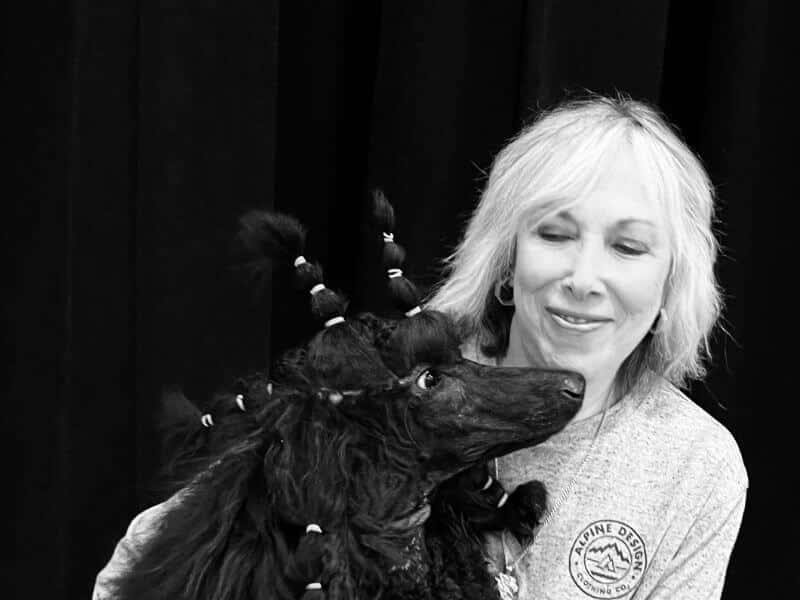Interview with Cynthia Horn, Breeder of Confection Standard Poodles
Where do I live? How many years as a breeder?
Cynthia Horn: I live in Brighton Heights, Pennsylvania. I have been passionate about Standard Poodles and involved in our sport for thirty years. I am a new breeder. My kennel name is Confection. (A confection is the mixing of different elements and ingredients to create something wonderful.) I started my breeding program by selecting a bitch whose pedigree held examples of the type I wanted to emulate. I picked a sire whose pedigree would hopefully complement those characteristics. My GCH Versailles Confection Tsunami, bred with CH Theory Starboy, proved to be an outstanding combination. Their breeding produced GCHS Confection Supernova Explosion At Theory, “Piper,” who is currently being shown by Elizabeth Reynolds.
Can I talk a bit about my facilities? Where are my puppies whelped? How are they raised?
Cynthia Horn: I use a large and separated room that has its own heating and cooling system. It uses an easy-to-set up-and-use Inkbird brand temperature controller. I have peace of mind knowing that it will alert me via my cell phone if the temperature goes out of range.
I also use a temperature-controlled heat, cable-based perimeter heater (details and availability at: mybreedersupply.com) that is situated under the pig rail.
It works like this: A cold pup will seek heat; this method draws a pup to safety and comfort under our whelping box’s pig rail. This carefully controlled heating system also provides a more comfortable environment for the dam. My puppies are home-raised with an emphasis on socialization.
How would I define “conditioning” as it relates to my breed?
Cynthia Horn: Conditioning a Standard Poodle should be built on a good diet, exercise, and early life socialization with people and other dogs.
Since Standard Poodles are intelligent, energetic, and athletic by nature, they need challenges. We use an Early Neurological Stimulation (ENS) exercise program in the early weeks of life to build a stable temperament and the ability to adapt to whatever life brings their way. I would never whelp and raise a litter without using this program. It’s that successful! We also use scent training in the early days of life. As a breeder, I am often asked about prey drive. I begin evaluating this trait early to see which pups may excel in performance or retrieving.
Do I think my breed is supported by a sufficient number of preservation breeders?
Cynthia Horn: Preservation breeders are out there, but we could always have more. My belief in preserving the original traits valued in the Standard Poodle is strong.
Is my breed well suited to be a family dog? Who are the best candidates to own my breed?
Cynthia Horn: Family dogs, companion dogs, service dogs, hunting dogs; they excel at most anything you ask them to do.
What is the biggest misconception about my breed? What is my breed’s best-kept secret?
Cynthia Horn: Standard poodles are not “frou-frou,” so don’t let that show coat fool you. Their best-kept secret is their versatility.
If I could share a comment or two with judges of my breed, what would I like to say to them?
Cynthia Horn: I would thank them for their invaluable contribution. They certainly have the knowledge, passion, and oftentimes, the courage to be the backbone of our sport. In a breed that has so many exemplary examples, I applaud their perseverance and conviction.
Do I have any words of wisdom to pass along to newer breeders?
Cynthia Horn: Study pedigrees. It sounds simple, but it’s essential to continue positive traits and breed out negatives. Breed for temperament, because most of your puppies will live in companion homes. Every breeder dreams of producing a Best in Show dog, but if you don’t grab that gold ring, that is not a failure. Happy, healthy companion dogs enriching people’s lives is a worthy goal in its own right. When choosing prospective show puppies, I look at temperament, structure, and movement. There should be an enthusiastic yet compliant personality in a show prospect. I begin working with them by setting them up and moving them at an early age. To me, the magic of a show dog is a quality of showmanship combined with correct, beautiful movement.








